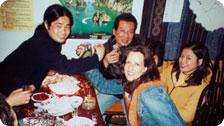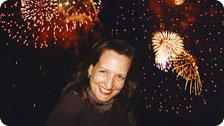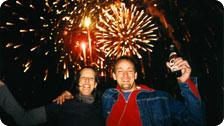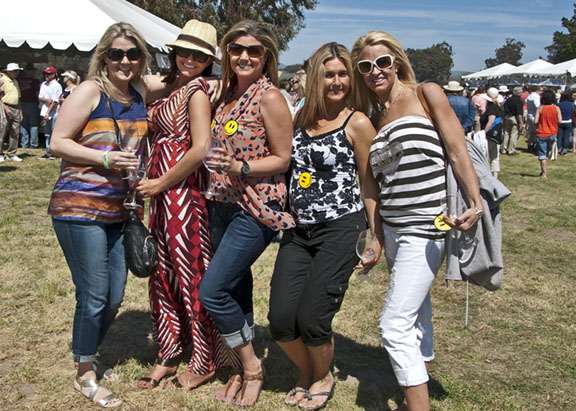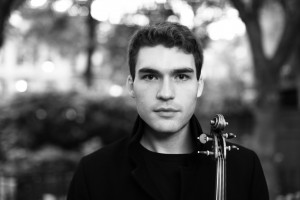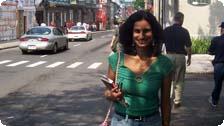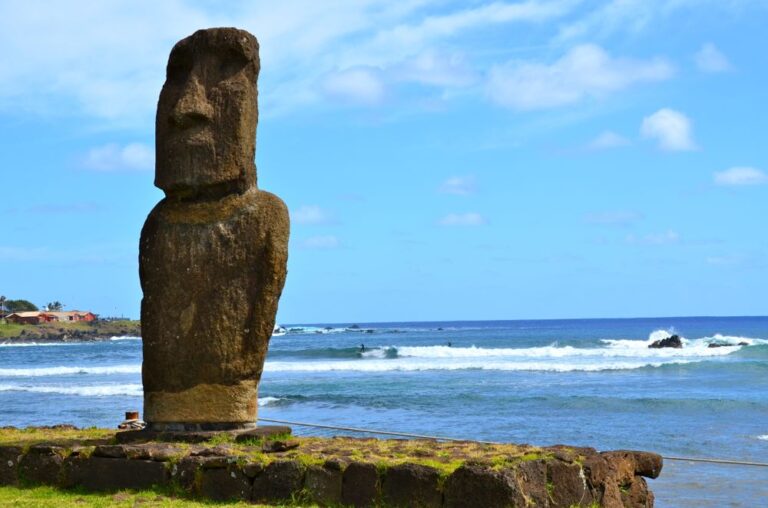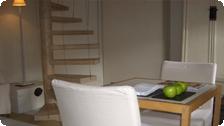Culture: Vietnam: The Tet Fest
by Lorraine Godfrey
It was well after dark when I arrived in Hanoi late one January evening in 2003. Coming from Bangkok, where temperatures loomed in the nineties (with equal humidity), I was prepared for the heat. I shared a cab from the airport with two locals, who directed me to the old quarter of town.
Driving into the city, I was struck by the odd, vertical architecture of Hanoi’s outskirts. I was also fascinated by the amount of motorbikes, mopeds, and bicycles. Entire families squeezed onto scooters. Young couples on mopeds, middle-aged women and young girls alike teetering on old-fashioned bicycles—all of them veering from every direction, at maximum speed, into the path of our cab. Yet aside from me, no one in the cab seemed fazed.
The taxi dropped me off in the center of the old part of town, where the inexpensive hotels are located. With my backpack on, I stood at a three-way intersection, unable to step off the curb. The two-wheeled traffic was incredibly dense and unending, like a human soup constantly stirring itself. There were no stoplights or signs to be found. I stood there caught like a deer in the headlights.
A bent, little old lady wearing a conical hat and balancing a bamboo rod over her shoulders with two wide rattan baskets filled with vegetables on each end grabbed me by my sleeve and forcibly dragged me into the street with her. She had surprised me from behind. My immediate reaction was to pull away, but she was determined. Comprehending that she didn’t mean any harm, I surrendered and let her lead me, amazed that the traffic never stopped or slowed but continued to flow in front of us and behind us.
Safely across, the woman let go of me, but not without a compulsory attempt to sell me something.
I thanked her but bought nothing and began my search for a hotel. On the third try, I found a room for eight dollars. The Queen Hotel looks exactly like what I expected to find, clearly old and a little neglected, but still retaining its faded colonial charm.
The landlady was gracious and sincere. She took me upstairs to the room (which was clean enough), with teak furniture and some plastic flip-flops arranged neatly by the door. I thought these might have been left over from a previous guest. The room had a long balcony overlooking the busy and narrow street below. The shower and toilet were private but they were accessibly only by the balcony.
Although it was cold the night I arrived, I didn’t expect it to last and imagined myself hanging my washing on the balcony and enjoying a cup of famous Vietnamese coffee as I people-watched in the mornings. I was grateful to have gotten settled without too much exertion so I unloaded my things and ventured out to find a place to have a drink and relax.
Just around the corner, I stepped into The Labyrinth on Ta Hien Street. The Vietnamese owner is a very talented and generous artist who’s created a special and welcoming environment for locals and tourists alike. His paintings hang on all the walls and he’s decorated the interior himself with a mad concoction of industrial-tropical flavor. The Scottish and Dutch bartenders made me feel at home immediately with a warm welcome and some smart-ass back-and-forth. Besides some bland European beers, they offer a fine selection of Vietnamese brews.
Vietnamese like beer. In every city there will be a specialty beer offered there and nowhere else. Hanoi is well known for its microbreweries, and its signature beer is Bia Hoi, always my first choice. Bia BaBa, which translates into “Fifty-five,” was also satisfying.
I met a Brit named Matt who’s been calling Hanoi his home for over a year. Matt had a wealth of helpful tips and advice. I was surprised to find quite a population of expats living in Vietnam. It’s truly bizarre to hear Westerners speaking Vietnamese. Something about the tonal quality of the language that makes these tall brutes sound like falsetto munchkins on speed. The aural and the visual just don’t compute.
Vietnam has a haunting and ethereal grace underneath its surface chaos, perhaps due to its long and violent history. In spite of its hard-won communist government, capitalism and poverty are everywhere. Hanoi has two lives, each offering abundant photo opportunities and sensory overload. From six in the morning, you hear a constant barrage of honking horns, whining engines, chatter, persistent cyclo drivers, postcard sellers, and twangy Vietnamese music blaring from every doorway.
After dark, everything goes quiet. Commerce and traffic stop and the masses withdraw back into their private lives. You can walk unmolested through the ancient and contorted alleyways, mesmerized by the lull and inhaling a heady mix of Jasmine and exotic nostalgia, hearing only the sound of the wind, a family eating dinner, or a lone voice singing.
North Vietnam experienced an unusually cold winter the year I visited and temperatures loitered around 11º celsius. A nightly mist enveloped the city. I was layering practically every piece of clothing I had packed to keep warm, but to no avail. I reluctantly purchased some warmer clothes. These helped, but I was still chilled.
I spent my days exploring the many shops and markets. I visited the War Museum, the Women’s Museum, and the Opera House, and I paid my respects to “Uncle Ho.” Partaking of the street food in Vietnam takes some getting used to. Clusters of people squat or sit on plastic stools on the sidewalk and eat. I thought these were families eating together before I realized they were businesses—and then I thought about communicable disease.
I stuck to restaurants for the first two days, but when you’re walking so much you really need to just stop and eat something quickly without all the bother of a restaurant. Eventually, I mustered the courage to sit down amongst these strangers, and I tried to pronounce Pho Bo (beef noodle soup), which was met with giggles and mutterings all around. The first time is the hardest, but I got what I wanted and it was delicious. I made it a daily ritual and I never took ill. I think it actually helped fend off the cold.
Besides Asian fare, France’s influence is still very strong in the cuisine and in the coffee. For a little more Dong, one can experience rich, delicate pastries, crisp baguettes, pates, truffles, smoked salmon, and rich cheeses. If frog legs whet your appetite, they’re offered everywhere, no matter how casual the establishment. (Personally, I have yet to try them.)
The balcony in my hotel room may have been charming in the summer months, but in late January it was a negative. I kept the windows and doors to the balcony closed and I dreaded having to use the toilet or take a shower. I went out most evenings, because it was warmer and I discovered new bars. Some notable bars I found were Half Man Half Noodle, which had a young, punk vibe, with bold graffiti all over the cavern-like stucco walls.
Highway 4 is not to be missed. It’s four stories high. Each floor is accessed from the back stairs, which look like they survived the American War. They’re super steep, rickety, and sagging. I ventured to the top, where I found a beautiful outdoor space with thatch-canopied seating areas. As the bar and kitchen are on the ground level, I found myself entertained by watching the wait staff run up and down these stairs, which they did without complaint or shortness of breath.
Highway 4 offers delicious Vietnamese cuisine in addition to their specialty of homemade rice wines. It boasts the largest selection of infused rice wines in the city. I was given a menu of labels, and adventurously sampled the silkworm rice wine. It is slightly milky in appearance and tastes like liquid fire; I was surprised not to find a little silkworm sitting in my cup. Besides offering many harmless and rather appetizing-sounding infusions of lotus, poppy, and dandelion flower, they also offer such acquired selections as fruit bat, gecko, bird, tarantula, bear, water bug…the list goes on and on.
Matt the Brit had told me that there is one traffic law in Vietnam. If a driver doesn’t honk their horn before they hit you, they are financially responsible for your injuries; but if they honk first, then you’re on your own—and possibly liable for any damage to their scooter! Since drivers honk nonstop, I doubt that a Westerner would win the argument. Within days, I found it easy to recognize the new tourists in town. No matter how narrow the street, they stand like statues staring dumbly at the traffic, unable to process a safe tactic to cross it. All you have to do is make eye contact and give an empathetic shoulder shrug to make a new traveling partner. I met Paul from Australia this way.
The big event of Tet is the firework display held at Hoan Kiem Lake in the city center. I had been invited to join my friends at The Labyrinth for a homemade Tet dinner and asked Paul to join us. Earlier that afternoon, Paul and had walked around the lake discussing how the noise and traffic would make the Tet event unbearable.
We decided to rent a hotel room overlooking the lake and found the ideal situation at The Lucky Hotel, located at 12 Hang Trong Street for twenty dollars, split between us. The hotel had four rooms available. We chose a deluxe room on the fourth floor with a balcony facing the street and roof access. Two queen-sized beds, TV with cable, a refrigerator stocked with ice, bottled water, different sodas, beer, and a selection of mini bottles of liquor. It was pure luxury—and at that price we could both afford to keep our other hotel rooms and not have to move our belongings! Exuberantly we agreed to meet up at the Labyrinth around seven p.m.
I arrived at The Labyrinth and was greeted the local regulars, my favorite bartenders, Matt, and Paul. There were new faces as well: two girls from Denmark, Jean Pierre from France, a couple from Kuala Lumpur, and Luan, a beautiful Laotian woman whose family moved to Hanoi when she was a child. Luan was impeccably tailored, and very outgoing.
I was intrigued by her right away and was pleased to meet an independent local woman who goes out alone to enjoy a good beer. I found out later that she was a seamstress and made all of her own clothes. Luan suffers from an old ear injury and doesn’t speak, although I believe she can. She communicates only in sign language. Surprisingly, it was quite easy to talk with her, even though I don’t know sign. It takes some creativity and humorous theatrics, and in dire straits she can read some English. Having a few beers didn’t hurt either.
Tet feast was a culinary treat. What an honor it was to be included in a homemade and lovingly prepared dinner with such good company. I wanted Tet to be special, and my dreams were being realized far beyond anything I could have imagined.
Around ten p.m., we invited anyone who wanted to come to our hotel for a rooftop fireworks party. It was a bit of a trek to the lake, and on the way we lost a few of our party in the jungle of motorbikes and pedestrians. The fireworks display was exhilarating. Practically right over our heads showered bright, multi-colored explosions. It went on for what seemed like hours. The crowd below was almost as deafening as the booms of the fireworks themselves. From our balcony, we could see the streets densely packed with moving masses for five or more blocks, left and right.
By midnight the show was over and the crowd had dispersed. Luan, Jean Pierre, Paul, and I ventured out to a disco Luan knew of. There we danced to House of Pain and industrial rock until early in the morning. By two a.m., though, my idea of a good time was curling up in a warm, comfy bed and watching some TV. So I bid goodnight to my friends, who were still partying like rock stars, and departed. The next morning, feeling clean and pampered from a long, hot shower, I decided that I could not return to my eight-dollar hotel room, but I wasn’t ready to spend twenty dollars every night, either. I’m a budget traveler.
The morning after Tet is New Year’s Day. I had only two things on my mind: find a better hotel to check into and check out of The Queen, and all before the eleven o’clock check-out time.
Even though it was still early, every door on the street was open and owners of the hotels were sitting inside their doorways, proudly displaying their newly purchased kumquat trees alongside arrangements of bright and prettily wrapped packages of sweets and treats. If the hotel looked too expensive, I just kept walking. Even when I politely said Khon Ka-moon (no thank you), they would still insist that I should at least take a treat. It was very confusing as to why I was getting this attention. I hadn’t experienced this on any other morning.
The Vietnamese are serious believers that the first day of a New Year will portend their luck for the rest of the year. So they try very hard to attract new business and generate Chi (energy). Even the act of walking through a door activates Chi. They believe that the more people to cross their threshold on New Year’s Day, the more good health and prosperity they’ll experience in the new year. At every door someone would courteously present a beautiful box of candied nuts and fruits for my approval and consumption. Their smiling, eager faces turning to disappointment when I declined and walked away.
Later, when I had settled my new accommodations, I remembered, “Oh my God, it’s TET!”
I sharply realized what being Western can mean in its most negative sense. In my single-mindedness I hadn’t had the time to politely accept or even admire their precious offerings. I had walked into and out of at least five hotels and had hurriedly passed many, many more. Unintentionally, I had jinxed the entire district! I felt like dirt when I told the sweet lady at the Queen Hotel that I was leaving. It was a very humbling experience.
I chose a room for twelve dollars in a new-ish hotel run by a young French couple who probably couldn’t have cared less about Chi. It had heat, no balcony, and the toilet and shower were inside. I’ve also read somewhere that it is considered very unfortunate if their first guest is a unmarried female. That’s me! Maybe I was doing the others a favor?
I stayed in Hanoi only two more nights. The day after the day after Tet, restaurants and businesses close down for days. Hanoi becomes a ghost town and it’s difficult to find food. The Labyrinth was open, but even the bar regulars seemed to have disappeared. I didn’t see Luan, Paul, Matt, or my bartender friends again. Sadly, it was time to move on, and I booked a three-day, two-night tour to Halong Bay.
I ran into Paul on Cat Ba Island in Halong Bay. He told me that since Tet, he had been staying at Luan’s house in Hanoi. She was sewing a suit for him and had introduced him to her mother. But that’s another story…
Discover more from Tango Diva
Subscribe to get the latest posts sent to your email.
